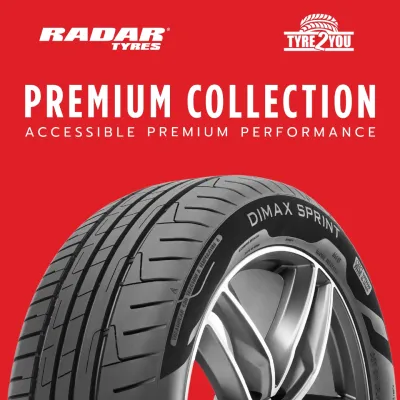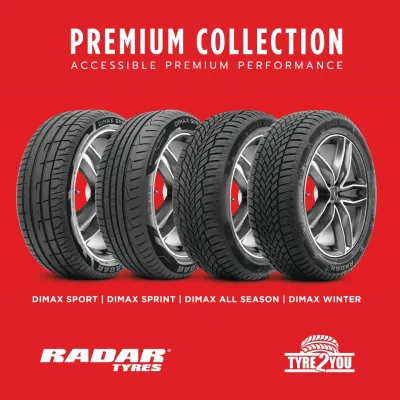Understanding the difference between all-season vs. seasonal Tyres
All-season tyres are designed to offer adequate performance in a range of conditions, combining some characteristics of both summer and winter tyres. They’re a popular choice in areas with moderate climates, as they save drivers from the hassle and cost of changing tyres twice a year.
However, despite its versatility, having all-season tyres can come at a cost: they don’t perform as well in very hot or very cold temperatures, and they may wear out faster if used in the wrong season.
Seasonal tyres are specifically engineered to suit either hot or cold weather. This distinction gives them a significant performance advantage. Here’s a closer look at each:
- Summer tyres are designed to provide optimal handling and grip on dry and wet roads in warm conditions. The rubber compound used in summer tyres is tailored to withstand higher temperatures, maintaining a firm grip on the road for improved braking and cornering.
- Winter tyres feature a specialized tread design and softer rubber compound that remains flexible in cold weather. This flexibility allows winter tyres to dig into snow and ice, delivering superior grip and reduced braking distances in sub-zero conditions.
Can you use winter Tyres in the summer?
Whilst it may seem convenient, it can negatively impact on your vehicle’s performance and most importantly your safety.
Winter tyres are made with a softer rubber compound to maximize grip on icy or snowy surfaces. This softness helps keep the tyre flexible in freezing temperatures, but it wears down quickly on hot summer pavement.
This not only shortens the lifespan of your winter tyres but also affects fuel efficiency, as the extra rolling resistance requires more energy to maintain speed. The tread pattern of winter tyres is optimized for cold-weather traction, not for quick braking or cornering on warm, dry roads.
Can you use summer tyres in the winter?
Just as winter tyres aren’t meant for summer, summer tyres are not safe to use in winter.
Summer tyres are designed to perform in warmer temperatures, with a rubber compound that stiffens significantly in cold weather. When the temperature drops, the traction on summer tyres decreases, leading to reduced grip on icy or snowy surfaces. This can make stopping quickly on slick roads challenging and increase the likelihood of accidents.
Using summer tyres in winter conditions is risky and can lead to severe safety issues, especially in areas prone to ice or snow.
Why switching to seasonal Tyres Is the best choice for You
Switching to seasonal tyres offers you many benefits that all-season tyres simply can’t match.
Improved Safety - Seasonal tyres provide better braking and handling in extreme conditions, whether it’s hot, dry pavement or icy roads. This added traction and control significantly reduces the risk of accidents, helping you feel more secure behind the wheel.
Better Performance - Tailored tyres are designed to meet the unique demands of each season. Winter tyres handle snow and ice well, while summer tyres offer a superior grip on dry and wet roads. By switching tyres, you maximize your vehicle’s performance year-round.
Extended Tyre Lifespan - Using winter tyres in winter and summer tyres in summer reduces wear and tear, extending the lifespan of each set. This could save you money overall, as you will need to replace tyres less frequently.
Fuel Efficiency - Seasonal tyres are optimized or specific temperatures, so your vehicle doesn’t have to work as hard to maintain traction. This results in better fuel economy, which helps offset the cost of owning multiple sets of tyres.
If you live in the UK where there are distinct seasons, switching to seasonal tyres is a smart choice for you to enhance your safety, performance, and durability. While all-season tyres do offer convenience, they can’t match the specialized capabilities of summer and winter tyres in extreme conditions.
By investing in a set of seasonal tyres, you can enjoy the confidence of a safer, more comfortable driving experience year-round. Book now at www.Tyre2You.co.uk









